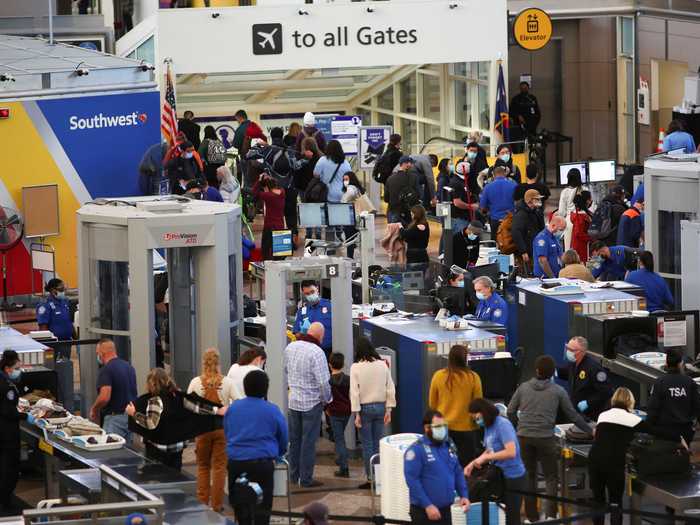
Masked passengers waited in lines at Los Angeles International Airport on November 23, 2020.Lucy Nicholson/Reuters
On Thursday, the Centers for Disease Control and Prevention (CDC) advised Americans against traveling for Thanksgiving, recommending that they stay home and celebrate with the people they live with instead.
The very next day, over 1 million people got on a plane.
In fact, the Transportation Security Administration (TSA) recorded its busiest travel weekend since March with more than 3 million people traveling through US airports this past Friday, Saturday, and Sunday.
While this is still less than half of the number of travelers recorded in 2019, the US is struggling with a fall surge of the coronavirus and is the worst-affected country in the world with the highest number of COVID-19 cases and deaths.
There have been 12,613,248 coronavirus recorded in the US at the time of writing, and 260,065 related deaths, according to the Johns Hopkins Coronavirus Resource Center.
As the photos below show, people are still traveling across the country for Thanksgiving, regardless of the CDC's advice.

Source: CDC

Source: TSA

Source: TSA


Source: TSA

Source: AAA

Source: AAA

Source: Insider

When asked by Margaret Brennan on CBS News' "Face the Nation" what he believes is riskier, planes or crowds at the airport, Fauci replied: "The crowd, clearly."
"Sometimes when you get a crowded plane, you're in a crowded airport, you're lining up, not everybody's wearing masks, that puts yourself at risk," he added.

Source: The New York Times

These states were all won by Donald Trump in the 2020 presidential election, The New York Times noted.
President Trump has been widely criticized for his handling of the coronavirus.
Critics maintain that he did not sufficiently acknowledge the virus' existence and severity, and that he failed to encourage public health recommendations, mostly flouting them himself, according to CNN.
Fauci also said in his "Face the Nation" interview that Thanksgiving air travel will "get us into even more trouble than we're in right now," adding that ignoring the public health recommendations could lead to an "exponential increase [in coronavirus cases] as you get into Christmas. And that's one of the things we're concerned about."
 I spent $2,000 for 7 nights in a 179-square-foot room on one of the world's largest cruise ships. Take a look inside my cabin.
I spent $2,000 for 7 nights in a 179-square-foot room on one of the world's largest cruise ships. Take a look inside my cabin. Saudi Arabia wants China to help fund its struggling $500 billion Neom megaproject. Investors may not be too excited.
Saudi Arabia wants China to help fund its struggling $500 billion Neom megaproject. Investors may not be too excited. Colon cancer rates are rising in young people. If you have two symptoms you should get a colonoscopy, a GI oncologist says.
Colon cancer rates are rising in young people. If you have two symptoms you should get a colonoscopy, a GI oncologist says. FSSAI in process of collecting pan-India samples of Nestle's Cerelac baby cereals: CEO
FSSAI in process of collecting pan-India samples of Nestle's Cerelac baby cereals: CEO
 Narcissistic top management leads to poor employee retention, shows research
Narcissistic top management leads to poor employee retention, shows research
 Audi to hike vehicle prices by up to 2% from June
Audi to hike vehicle prices by up to 2% from June

Copyright © 2024. Times Internet Limited. All rights reserved.For reprint rights. Times Syndication Service.